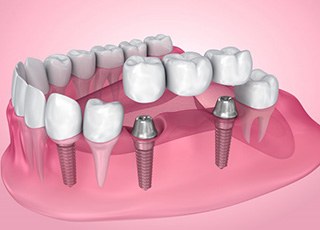Dentures – Grand Prairie, TX
Quickly Regain a Complete, Confident Smile
Teeth may be relatively small, but they play a big role in your quality of life! Tooth loss can make it more difficult to eat comfortably, speak clearly, and feel good about your appearance. Thankfully, at Care 32 Dental of Grand Prairie, we can help you quickly regain a complete, confident smile with custom-made dentures in Grand Prairie. These classic restorations are made with high-quality materials and state-of-the-art technology, making them more comfortable, beautiful, and functional than ever before! Read on to learn more about dentures and give us a call when you’re ready to schedule your consultation.

Why Choose Care 32 Dental of Grand Prairie For Dentures?
- State-of-the-Art Equipment for Beautiful, Long-Lasting Results
- Evening and Weekend Hours Available for Your Convenience
- Flexible Payment Options to Make Treatment Affordable
Types of Dentures

Dentures are a great choice for patients suffering from moderate to severe tooth loss. Whether you’re missing multiple pearly whites or an entire arch, a custom-made denture can help. Each one is crafted from reliable, natural-looking materials like dental porcelain and gum-colored acrylic to ensure your smile looks good as new! There are several types of dentures to choose from, including:
Partial Dentures

Sometimes called partials, partial dentures are designed to replace multiple missing teeth like a puzzle piece. Custom-made replacement teeth are held precisely and seamlessly between your remaining healthy teeth with the help of small, unnoticeable metal wires and clasps that wrap around your natural dental structures.
Full Dentures

If you’re missing your entire top arch of teeth, bottom arch of teeth, or both, a full denture can help you enjoy a complete set of pearly whites once again! These replacement teeth are set into a gum-colored base that fits snugly on top of your gums. This close, precise fit creates a strong suction that holds your denture in place as you talk, eat and laugh.
Implant Dentures

Alternatively, you can anchor your full or partial denture in place with dental implants. Instead of relying on your remaining teeth or gums for support, this type of denture is supported by small titanium implant posts that are inserted directly into the jawbone. Not only does this ensure your new smile doesn’t slip out of place, but it will prevent jawbone deterioration and has the potential to last a lifetime.
Who Is a Good Candidate for Dentures?

Almost anyone with missing teeth can be an excellent candidate for dentures. The first step to replacing your lost teeth with a set of these remarkably lifelike prosthetic appliances is to schedule a consultation at our office in Grand Prairie so our dentist can evaluate your oral health and design an effective treatment plan. If you’re not ready for dentures yet, you may be able to become a suitable candidate later after receiving periodontal treatments to restore your gums or bone grafts to reinforce your jawbones.
Effects of Missing Teeth

Tooth loss can happen due to reasons like injury, decay, age, and malnutrition, and neglecting to replace lost teeth can lead to significant consequences for your oral and overall health. After a tooth is lost, the bone structure that supported it will begin to recede and atrophy due to lack of exercise, and this can pull neighboring teeth out of alignment and make them more vulnerable to damage. This can lead to further tooth loss as well as facial sagging, trouble speaking, difficulty eating, and diminished self-esteem.
What Qualifies You for Dentures?

Dentures can be an excellent option for many patients who have experienced extensive tooth loss, severe dental sensitivity, or advanced dental infections as long as their gums and jawbones are sufficiently healthy. After receiving your appliance, you’ll also need to commit to a daily regimen of oral hygiene and denture maintenance. Dentures can also be much more affordable than some other dental restorations, making them excellent for many patients on a budget.
The best type of denture for you depends on how many teeth you are missing. For example, a partial denture can replace one or many missing teeth while a full denture can replace an entire arch. If you’re looking for the most stable hold possible so you can exert maximum chewing power and speak with the utmost confidence, you may wish to consider securing your dentures with dental implants.
Alternative Tooth-Replacement Options

Patients who aren’t suitable candidates for dentures may be interested in other tooth replacement options. At Care 32 Dental of Grand Prairie, we offer several alternative treatments, including:
Dental bridges: These appliances are one or several artificial teeth strung between two dental crowns or dental implants, and they can be used to replace up to four missing teeth in a row. However, the patient will need healthy teeth on either side of the gap to support the dental crowns or sufficiently strong jawbones to support the implants.
Dental implants: These titanium posts are surgically inserted into the jawbone and fused with their surrounding bone tissue through the natural process of osseointegration. Patients must have healthy bone structure to support these devices, and while they are more expensive than dentures, they are permanent.
How Dentures Are Made

We keep saying that your dentures will be “custom-made,” but what does that look like? If you want to know more about the details that will go into making your perfect set of dentures, you’re in the right section! Below, we’ll walk you through the denture fabrication process. You’ll get an idea of the types of materials we use, how we determine the proper size, shape, and color, and what they’ll feel like when you first use them. Give the information a readthrough and let us know if you have any questions!
What Are Dentures Made Of?

Dentures have two parts – a base and a set of false teeth – that are each made of separate materials. Here’s what typically goes into each part:
- The base is the gum-colored foundation that will support your false teeth. For full dentures, we usually recommend an acrylic base, as it often blends in the best with natural gum tissue. Acrylic bases are also suitable for partial dentures, though we may add metal clips to help them stay firmly in place.
- The false teeth or “replacement teeth” are made from either resin or porcelain. Both materials can look incredibly natural, but porcelain tends to be the more popular choice because of its durability and realistic sheen.
The Denture Creation Process

To fully customize your dentures and make sure they fit comfortably, we first have to take impressions of your mouth. This will give us accurate measurements of your smile that we’ll then recreate on a plaster model.
The reason we create this model is so we can give our partners at the dental lab a very precise idea of what size and shape is needed for your dentures. They’ll design a wax mold for your base and replacement teeth and will pass this version of your dentures back to us.
Depending on how the mold fits on your gums, we’ll send it to the lab for any final adjustments and to complete the fabrication process. Our trusted technicians will actually boil your dentures, essentially filling the wax mold with your permanent base and tooth materials. The boiling is simply to melt away the wax – otherwise we don’t recommend boiling your dentures!
Once we receive your polished, wax-free dentures, we’ll test the fit one more time to make sure you’re absolutely happy with it. Then you’ll be free to return home and try them out!
Adjusting to Your New Dentures

Since you’ll have a completely new oral device supporting your smile, your dentures might feel strange at first. This is normal, and as you get more and more used to them, the discomfort should fade. However, if it persists, be sure to give us a call so we can help!
The Benefits of Dentures

Dentures have been a popular way to replace missing teeth for a long time, and it’s easy to see why! Missing several or many teeth can make activities of daily living such as eating and speaking more difficult, and dentures have allowed countless patients to smile, chew, and converse with confidence after extensive tooth loss. Here’s a brief guide to a few of the benefits dentures can provide.
Psychological Benefits

Severe tooth loss can take a considerable toll on your self-image, making it harder to smile proudly and have confidence in your appearance. Smiling frequently also encourages your body to release its natural feel-good chemicals like serotonin, and people with missing teeth often experience depression or difficulty engaging in social activities. Restoring your smile with dentures can also restore your self-esteem and confidence.
Clearer Enunciation

Tooth loss can considerably alter the way air flows about the mouth and the way a patient forms sounds when speaking, which can result in lisping or other speech difficulties. Since dentures act in the places of your missing teeth, they can restore your ability to speak clearly. While you may need a little time to get used to speaking with dentures, it should come easily and naturally as you get more practice.
Improves Nutrition

Many nutritious foods like fresh cuts of meat, crunchy nuts and seeds, and snappy raw fruits and veggies have tough or fibrous textures that make them hard to chew with missing teeth. Difficulty eating can lead to overall health issues like indigestion and malnutrition, but dentures can restore much of your mouth’s natural chewing ability so you can enjoy a varied and interesting diet that includes many flavors and textures as well as necessary nutrients.
Preserves Oral Health

Dentures can protect your smile from injury and infection by defending the gums from food debris and bracing the remaining teeth so they do not shift out of alignment. Since dentures can help your mouth distribute the pressure of chewing more evenly, they can also spare your remaining teeth from unnecessary wear and tear.
Expands Opportunities

One 2019 study found that those with poor oral health were less likely to be employed. When meeting someone for the first time, most people say that their smile is one of the first things they notice about them. Having a gorgeous grin that you’re proud to show off can give you a significant advantage in job interviews and sales or when seeking a promotion, and it can also open up a whole host of social opportunities as well.
Dentures FAQs
Should I Have All My Teeth Pulled to Get Dentures?
Repairing a damaged tooth whenever possible is always preferable to replacing it. Tooth extractions of any kind will only ever be recommended if deemed absolutely necessary, like when the tooth is too damaged to save thanks to extensive decay, severe infection, or trauma that’s broken away most of the enamel. If all of the teeth in an arch are decayed or infected with gum disease, replacing them with dentures may be a viable option, but we will always explore all other possibilities before recommending extractions for dentures.
Can I Sleep with My Dentures?
Dentists generally recommend that you take your dentures out at night when you go to bed. When you first get your dentures, you’ll typically be told to keep them in your mouth for 24 hours, including when you sleep. After this, you should be taking it out every evening. This is because wearing dentures restricts the circulation in your gums, leading to soft-tissue irritation and potentially speeding up ridge resorption. Taking out your dentures gives your gums a chance to recover and get the nutrients they need while you catch some Z’s.
Will It Hurt to Get Dentures?
If you need to have teeth extracted before you get dentures, you are likely to experience some discomfort after oral surgery. Take your prescribed pain relievers as directed. The discomfort should improve after 3 to 5 days. When you first get new dentures, some minor irritation may occur as your mouth adjusts. The amount of time that this process takes will vary from person to person. If pain persists, give us a call!
Can You Still Eat Steak with Dentures?
Tough meats, like steak, are often difficult to chew with dentures, but it’s still possible to do so if you take the right precautions. Pick out tenderloins and other beef cuts that don’t contain as many connective tissues or muscle fibers. Make sure that the meat is thoroughly tenderized beforehand. Cut the steak into very small, manageable pieces.
